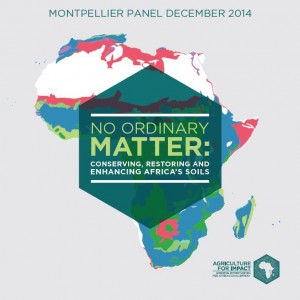Agriculture for Impact presented the new Montpellier Panel report ‘No Ordinary Matter: Conserving, Restoring and Enhancing Africa’s Soils’ on Thursday 4th December 2014 at the International Fund for Agricultural Development, Rome- ahead of World Soil Day on the 5th of December.
In sub-Saharan Africa, an estimated 65 per cent of soils are degraded, and unable to nourish the crops the chronically food insecure continent requires. Poverty, climate change, population pressures and inadequate farming techniques are leading to a continuous decline in the health of African soils, whilst the economic loss is estimated at USD 68 billion per year. Conversely, better land management practices could deliver up to USD 1.4 trillion globally in increased crop production – 35 times the losses.
This report from the Montpellier Panel argues that if left unaddressed, the cycle of poor land management will result in higher barriers to food security, agricultural development for smallholder farmers and wider economic growth for Africa.
The report is a comprehensive analysis of land management in Africa today, and answers a series of critical questions:
- Are donors and governments neglecting soil health in Africa?
- What are the key approaches to restoring Africa’s soils?
- How can improved land management tackle climate change in Africa?
Agriculture’s ability to catalyse rural development and eradicate poverty has been widely cited, with the World Bank claiming GDP growth from agriculture in Africa approximately 11 times more effective for reducing poverty than growth coming from any other sector. In 2006, the African Union’s Abuja declaration called for fertiliser use in sub-Saharan Africa to increase from today’s average of 8 kg/ha — the world’s lowest — to at least 50 kg/ha by 2015. However, agriculture must be implemented sustainably in order for food security to be possible for future generations, therefore the panel calls for ‘Integrated Soil Management’; combining targeted and selected use of fertilisers alongside traditional methods such as application of livestock manure, intercropping with nitrogen-fixing legumes or covering farmland with crop residues.
The launch was opened by Kanayo Nwanze, President of the International Fund for Agricultural Development at the United Nations in Rome.
Director of Agriculture for Impact, Professor Sir Gordon Conway chaired the panel discussion – comprising David Radcliffe Senior Advsior for Development and Cooperation DG at the European Commission, Camilla Toulmin, Director of the IIED, and Henri Carsalade, Agropolis Foundation – before opening up the conversation to questions from the audience.
You can also click here to watch the recording of the event, courtesy of IFAD
Related stories in the media;
Soil isn’t sexy – but it could explain hunger in Africa, The Guardian
African soil crisis threatens food security, says study, BBC News
African Soil Report, BBC World Service
Montpellier Panel issues its report on Africa’s soil degradation, The Ethiopia Observatory
Dirty deeds: Soil degradation costs African farmers $68 billion yearly, Thomson Reuters Foundation
Montpellier Panel Report Launch, “No Ordinary Matter: conserving, restoring & enhancing Africa’s soils”, UKCDS
Neglecting African soil could derail development and climate goals, says new Montpellier Panel report, IFAD
IFAD, Montpellier Panel Urges Action to Reverse Land Degradation in Africa, IISD
Why Africa’s degraded soils will cost the continent dearly, This Is Africa
Soil degradation costs African farmers $68bn yearly, Daily Times
BBC radio show with Ousmane Badiane








[…] panel constituting African and European members, the Panel, has issued its 36-page report, titled: No Ordinary Matter; Conserving, Restoring and Enhancing Africa’s soils, whose presentation is linked to the World Soil Day on December 5, 2014. It is rather adding its […]
[…] consequences of subpar soils are far-reaching. A new report from the Montpellier Panel, ‘No Ordinary Matter: Conserving, Restoring and Enhancing Africa’s Soils’, suggests that failing to tackle soil degredation in Africa – which affects two-thirds of arable […]
[…] The latest report from the Montpellier Panel, convened by Agriculture for Impact, is a comprehensive analysis of land management issues in Africa today and offers a range of recommendations for African governments and donors on how conserve, restore and enhance Africa’s ailing soils. Read more >> […]
[…] Agriculture for Impact presented the new Montpellier Panel report ‘No Ordinary Matter: Conserving, Restoring and Enhancing Africa’s Soils’ on Thursday 4th December 2014 at the International Fund for Agricultural Development, Rome- ahead of World Soil Day on the 5th of December […]
[…] Agriculture for Impact: Montpeller Panel report on soil “No Ordinary Matter” […]
[…] The latest report from the Montpellier Panel, convened by Agriculture for Impact, is a comprehensive analysis of land management issues in Africa today and offers a range of recommendations for African governments and donors on how conserve, restore and enhance Africa’s ailing soils. Read more >> […]
[…] of the recommendations of the new Montpellier Panel report ‘No Ordinary Matter: Conserving, restoring and enhancing Africa’s soils’ suggests that a Big Data Revolution is needed to fill the huge gaps in data availability, […]